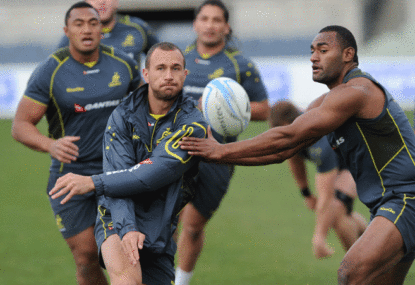Rugby Australia's debts blow out to almost $89 million after draw-down of PEP facility
Phil Waugh is hopeful that windfalls from the 2025 British & Irish Lions tour and the 2027 RWC will be more than enough to pay back the debt.

The ARU has announced a brand new domestic rugby competition to commence in 2014.
The National Rugby Championship will air on Fox Sports, with one live match per round, plus live semi-finals and final.
In terms of team locations and number of teams between eight-and-ten teams from the five Australian Super Rugby club homes of Brisbane, Canberra, Melbourne, Perth and Sydney will be included, plus other ‘major population centre’ locations.
The ARU have indicated that the following factors will determine club viability and ultimate inclusion in the new competition: finances; professional staffing; commitment to player development; venues; links to Super Rugby and fan base.
The announcement from the ARU follows below:
“This is a major vote of confidence in Australian rugby. This competition, which will include 8-10 teams from major population centres from across Australia, will also offer the opportunity to introduce innovative rules to the game to improve the spectacle for our fans,” said Mr Pulver.
“The National Rugby Championship will run annually at the end of Super Rugby and club rugby seasons from August to October as a way of complementing existing competitions such as the important Premier Rugby competitions in Sydney and Queensland.
“It will also be self-funded thanks to the support of Fox Sports and Foxtel.
“This new competition will be a tremendous opportunity for rugby fans to support teams from across the country in a local competition that we hope will rival New Zealand’s ITM Cup and South Africa’s Currie Cup at a time of year when there is little local rugby being played.
“I’d like to acknowledge the support shown by stakeholders and club competitions across the country, particularly in Sydney and Queensland, where Premier Rugby competitions are working to schedule their seasons to avoid any scheduling clashes with the National Rugby Championship.
“We will continue to work with stakeholders at all levels of rugby, including at club level, to further improve the vital role they play to create elite players.”
Australian Rugby Union has set up the National Rugby Championship Commission to establish the competition.
The Commission includes representatives from Australian Rugby Union, the Rugby Union Players’ Association (RUPA), Super Rugby, Fox Sports and Foxtel. It is chaired by independent sports consultant, John Boultbee AM, who has worked extensively in Australian and international sport including rowing, soccer and at the Australian Institute of Sport.
The announcement of the new competition has been welcomed by RUPA, which has strongly advocated for Australian rugby to improve the elite player development pathway.
RUPA CEO Greg Harris said RUPA is pleased to have played a key role in the inception of the National Rugby Championship.
“In 2007, 98% of our members said there was a missing link in the transition from club level to Super Rugby so we’re very excited and optimistic about the long-term benefits that a high-level, national competition can deliver to the game competitively and commercially.
“This new competition will give all non-Wallaby Super Rugby players an opportunity to continue to develop their skills in elite match conditions and will provide an opportunity for an additional 150 players to experience rugby in a semi-professional environment.”
Expressions of interest are now being sought from existing clubs wanting to compete in their own right, clubs wanting form a syndicate with other organisations such as universities or individuals who would like to apply for a place in the competition.
Expressions of Interest close on 13 January 2014, which will be followed by a formal tendering process, with successful teams expected to be announced by the end of February 2014.
Successful teams will be selected based on a number of criteria including: financial performance; professional team staffing structure and environment; commitment to player development; venue facilities; links to Super Rugby clubs; and current or potential fan base.